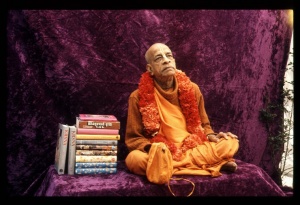SB 10.5.11: Difference between revisions
m (1 revision(s)) |
No edit summary |
||
| Line 1: | Line 1: | ||
{{info | {{info | ||
|speaker= | |speaker=Śukadeva Gosvāmī | ||
|listener=King | |listener=King Parīkṣit | ||
}} | }} | ||
[[Category:Srimad-Bhagavatam - Canto 10 Chapter 05]] | |||
[[Category:Bhagavatam Verses Spoken by Sukadeva Gosvami - Vanisource|100511]] | |||
<div style="float:left">'''[[Srimad-Bhagavatam]] - [[SB 10|Tenth Canto]] - [[SB 10.5: The Meeting of Nanda Maharaja and Vasudeva|Chapter 5: The Meeting of Nanda Mahārāja and Vasudeva]]'''</div> | |||
<div style="float:right">[[File:Go-previous.png|link=SB 10.5.10]] '''[[SB 10.5.10]] - [[SB 10.5.12]]''' [[File:Go-next.png|link=SB 10.5.12]]</div> | |||
{{RandomImage}} | |||
==== TEXT 11 ==== | ==== TEXT 11 ==== | ||
<div | <div class="verse"> | ||
gopyaḥ sumṛṣṭa-maṇi-kuṇḍala-niṣka-kaṇṭhyaś | :gopyaḥ sumṛṣṭa-maṇi-kuṇḍala-niṣka-kaṇṭhyaś | ||
citrāmbarāḥ pathi śikhā-cyuta-mālya-varṣāḥ | :citrāmbarāḥ pathi śikhā-cyuta-mālya-varṣāḥ | ||
nandālayaṁ sa-valayā vrajatīr virejur | :nandālayaṁ sa-valayā vrajatīr virejur | ||
vyālola-kuṇḍala-payodhara-hāra-śobhāḥ | :vyālola-kuṇḍala-payodhara-hāra-śobhāḥ | ||
</div> | </div> | ||
| Line 17: | Line 22: | ||
==== SYNONYMS ==== | ==== SYNONYMS ==== | ||
<div | <div class="synonyms"> | ||
''gopyaḥ''—the ''gopīs''; ''su-mṛṣṭa''—very dazzling; ''maṇi''—made of jewels; ''kuṇḍala''—wearing earrings; ''niṣka-kaṇṭhyaḥ''—and having little keys and lockets hanging from their necks; ''citra-ambarāḥ''—dressed with varieties of colored embroidery; ''pathi''—on their way to Yaśodāmayī's house; ''śikhā-cyuta''—fell from their hair; ''mālya-varṣāḥ''—a shower of flower garlands; ''nanda-ālayam''—to the house of Mahārāja Nanda; ''sa-valayāḥ''—with bangles on their hands; ''vrajatīḥ''—while going (in that costume); ''virejuḥ''—they looked very, very beautiful; ''vyālola''—moving; ''kuṇḍala''—with earrings; ''payodhara''—with breasts; ''hāra''—with flower garlands; ''śobhāḥ''—who appeared so beautiful. | |||
</div> | </div> | ||
| Line 24: | Line 29: | ||
==== TRANSLATION ==== | ==== TRANSLATION ==== | ||
<div | <div class="translation"> | ||
In the ears of the gopīs were brilliantly polished jeweled earrings, and from their necks hung metal lockets. Their hands were decorated with bangles, their dresses were of varied colors, and from their hair, flowers fell onto the street like showers. Thus while going to the house of Mahārāja Nanda, the gopīs, their earrings, breasts and garlands moving, were brilliantly beautiful. | In the ears of the gopīs were brilliantly polished jeweled earrings, and from their necks hung metal lockets. Their hands were decorated with bangles, their dresses were of varied colors, and from their hair, flowers fell onto the street like showers. Thus while going to the house of Mahārāja Nanda, the gopīs, their earrings, breasts and garlands moving, were brilliantly beautiful. | ||
</div> | </div> | ||
| Line 31: | Line 36: | ||
==== PURPORT ==== | ==== PURPORT ==== | ||
<div | <div class="purport"> | ||
The description of the gopīs, who were going to the house of Mahārāja Nanda to welcome Kṛṣṇa, is especially significant. The gopīs were not ordinary women, but expansions of Kṛṣṇa's pleasure potency, as described in the Brahma-saṁhitā (5.37,29): | The description of the ''gopīs'', who were going to the house of Mahārāja Nanda to welcome Kṛṣṇa, is especially significant. The ''gopīs'' were not ordinary women, but expansions of Kṛṣṇa's pleasure potency, as described in the ''Brahma-saṁhitā'' (5.37,29): | ||
:ānanda-cinmaya-rasa-pratibhāvitābhis | :''ānanda-cinmaya-rasa-pratibhāvitābhis'' | ||
:tābhir ya eva nija-rūpatayā kalābhiḥ | :''tābhir ya eva nija-rūpatayā kalābhiḥ'' | ||
:goloka eva nivasaty akhilātma-bhūto | :''goloka eva nivasaty akhilātma-bhūto'' | ||
:govindam ādi-puruṣaṁ tam ahaṁ bhajāmi | :''govindam ādi-puruṣaṁ tam ahaṁ bhajāmi'' | ||
(5.37) | :(Bs 5.37) | ||
:''cintāmaṇi-prakara-sadmasu kalpa-vṛkṣa-'' | |||
:''lakṣāvṛteṣu surabhīr abhipālayantam'' | |||
:''lakṣmī-sahasra-śata-sambhrama-sevyamānaṁ'' | |||
:''govindam ādi-puruṣaṁ tam ahaṁ bhajāmi'' | |||
:(Bs 5.29) | |||
Kṛṣṇa is always worshiped by the ''gopīs'' wherever He goes. Therefore Kṛṣṇa is so vividly described in [[Srimad-Bhagavatam|''Śrīmad-Bhāgavatam'']]. Śrī Caitanya Mahāprabhu has also described Kṛṣṇa in this way: ''ramyā kācid upāsanā vrajavadhū-vargeṇa yā kalpitā''. All these ''gopīs'' were going to offer Kṛṣṇa their presentations because the ''gopīs'' are eternal associates of the Lord. Now the ''gopīs'' were more jubilant because of the news of Kṛṣṇa's appearance in Vṛndāvana. | |||
</div> | |||
<div style="float:right; clear:both;">[[File:Go-previous.png|link=SB 10.5.10]] '''[[SB 10.5.10]] - [[SB 10.5.12]]''' [[File:Go-next.png|link=SB 10.5.12]]</div> | |||
__NOTOC__ | |||
__NOEDITSECTION__ | |||
</div> | |||
__NOTOC__ | |||
Revision as of 07:23, 19 May 2021

A.C. Bhaktivedanta Swami Prabhupada
TEXT 11
- gopyaḥ sumṛṣṭa-maṇi-kuṇḍala-niṣka-kaṇṭhyaś
- citrāmbarāḥ pathi śikhā-cyuta-mālya-varṣāḥ
- nandālayaṁ sa-valayā vrajatīr virejur
- vyālola-kuṇḍala-payodhara-hāra-śobhāḥ
SYNONYMS
gopyaḥ—the gopīs; su-mṛṣṭa—very dazzling; maṇi—made of jewels; kuṇḍala—wearing earrings; niṣka-kaṇṭhyaḥ—and having little keys and lockets hanging from their necks; citra-ambarāḥ—dressed with varieties of colored embroidery; pathi—on their way to Yaśodāmayī's house; śikhā-cyuta—fell from their hair; mālya-varṣāḥ—a shower of flower garlands; nanda-ālayam—to the house of Mahārāja Nanda; sa-valayāḥ—with bangles on their hands; vrajatīḥ—while going (in that costume); virejuḥ—they looked very, very beautiful; vyālola—moving; kuṇḍala—with earrings; payodhara—with breasts; hāra—with flower garlands; śobhāḥ—who appeared so beautiful.
TRANSLATION
In the ears of the gopīs were brilliantly polished jeweled earrings, and from their necks hung metal lockets. Their hands were decorated with bangles, their dresses were of varied colors, and from their hair, flowers fell onto the street like showers. Thus while going to the house of Mahārāja Nanda, the gopīs, their earrings, breasts and garlands moving, were brilliantly beautiful.
PURPORT
The description of the gopīs, who were going to the house of Mahārāja Nanda to welcome Kṛṣṇa, is especially significant. The gopīs were not ordinary women, but expansions of Kṛṣṇa's pleasure potency, as described in the Brahma-saṁhitā (5.37,29):
- ānanda-cinmaya-rasa-pratibhāvitābhis
- tābhir ya eva nija-rūpatayā kalābhiḥ
- goloka eva nivasaty akhilātma-bhūto
- govindam ādi-puruṣaṁ tam ahaṁ bhajāmi
- (Bs 5.37)
- cintāmaṇi-prakara-sadmasu kalpa-vṛkṣa-
- lakṣāvṛteṣu surabhīr abhipālayantam
- lakṣmī-sahasra-śata-sambhrama-sevyamānaṁ
- govindam ādi-puruṣaṁ tam ahaṁ bhajāmi
- (Bs 5.29)
Kṛṣṇa is always worshiped by the gopīs wherever He goes. Therefore Kṛṣṇa is so vividly described in Śrīmad-Bhāgavatam. Śrī Caitanya Mahāprabhu has also described Kṛṣṇa in this way: ramyā kācid upāsanā vrajavadhū-vargeṇa yā kalpitā. All these gopīs were going to offer Kṛṣṇa their presentations because the gopīs are eternal associates of the Lord. Now the gopīs were more jubilant because of the news of Kṛṣṇa's appearance in Vṛndāvana.